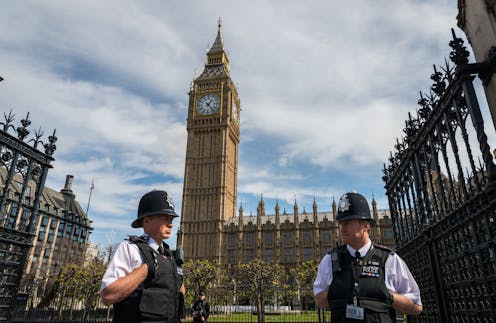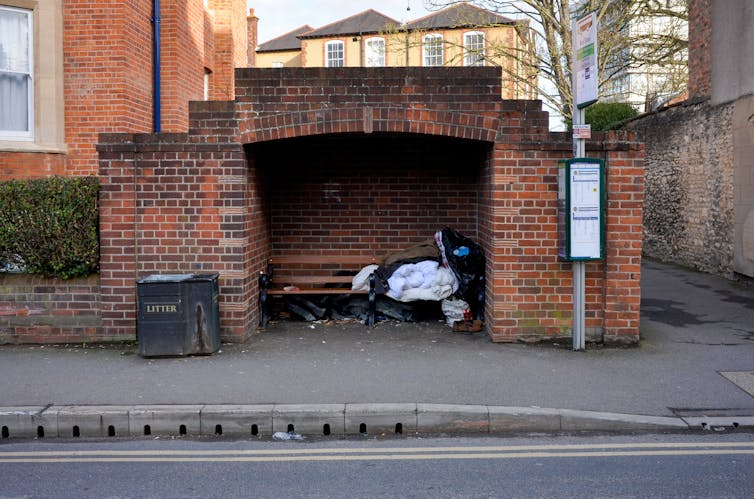
The UK parliament is currently considering a massive overhaul of police powers, sentencing and criminal offences in a new criminal justice bill. The wide-ranging bill also addresses “nuisance” rough sleeping, police ethics and misconduct and antisocial behaviour, among other areas.
It follows the Police, Crime, Sentencing and Courts Act, which was passed in 2022 and increased police powers over protest, as well as for preventing and investigating serious violence. In introducing the new criminal justice bill, James Cleverly, the home secretary, has argued that as threats evolve, the law needs to be updated.
Labour has said that it supports the criminal justice bill. Yvette Cooper, the shadow home secretary, has said that much of what’s included were Labour policies or have been called for by the party.
But there is still much to debate in parliament. The bill is in the report stage, where MPs consider amendments. And with the number of amendments tabled (upwards of 150), this is likely to take several days.
It is not unusual for criminal justice legislation to be wide-ranging. However, this bill is at risk of becoming “Christmas tree” legislation – adorned with unrelated amendments – and losing its initial focus of enhancing police powers and lengthening prison sentences. Here is a look at what is contained in the bill.
Expanding police powers
The bill would give police new powers to enter premises without a warrant to search for and seize suspected stolen goods. Former home secretary Priti Patel warned such powers could be misused, leading to miscarriages of justice.
To mitigate this risk, amendments have been added to require the professional policing body to publish a code of practice on the use of these powers. However, previous research suggests that some police officers view such codes as recommendations rather than mandatory, due to a working culture that encourages them to bend the rules to get the job done quickly.
The bill also expands powers to test suspects in police detention for drugs. Currently, police can test people for class A drugs if they have been arrested for a specific “trigger offence”, including theft, handling of stolen goods and drug possession. The new powers would extend this to some class B and C drugs, and under a wider range of trigger offences.
The bill would also allow police to test suspects for drugs at a location other than a police station. MPs have raised concerns about police capacity to undertake this testing and of availability of drug treatment services to refer those who test positive. They have also questioned whether it should be the role of the police to refer those who test positive.
Transfer of prisoners abroad
The bill contains several measures on sentencing, including mandatory attendance at sentencing hearings following several high-profile perpetrators refusing to attend court. A judge can already order someone to attend court, so this is more reaction to the rebuke following convicted murderer Lucy Letby not attending her sentencing hearing in August 2023.
The bill also proposes allowing prisoners in England and Wales to be transferred to overseas prisons. The justification for this is scant and can only be assumed to be related to the high cost of imprisonment in England and Wales, and current prison overcrowding. In October 2023, two-thirds of prisons were over capacity.
MPs have raised concerns about how this would work in practice, the effect it would have on families visiting prisoners (which is essential for successful resettlement following imprisonment) as well as the standards of foreign prisons.
There is a separate bill on sentencing currently making its way through parliament that also has implications for prison capacity.
Nuisance begging and rough sleeping
The bill proposes prevention notices, prevention orders and offences related to “nuisance” begging and rough sleeping. Opponents, including the Labour party, argue that these proposals criminalise homelessness and are written too vaguely. Many of the Labour amendments to this end have been withdrawn or defeated.
Such legislation may only exacerbate this behaviour, as they may make it harder for people to find employment and stable housing following these sanctions.

A particularly controversial part of the original version of the bill stated that someone could be considered a nuisance if they are sleeping in a doorway, if they have “excessive smell” or if they look like they are “intending” to sleep on the streets.
Reaction from homelessness charities such as Crisis, as well as opposition from Conservative and Labour MPs, led to the wording being changed.
New criminal offences – and everything else
The bill includes several measures relating to the non-consensual taking, making or sharing of intimate photos and videos. It did not originally include deepfake images – the government cited the Law Commission’s research that concluded that such images are not “sufficiently harmful”.
Following opposition from Labour and work by campaigners, last month the government changed course and announced it would table a new clause to make it an offence to create sexually explicit deepfake images. It is already a criminal offence – under the Online Safety Act – to share such images.
Read more: Deepfake porn: why we need to make it a crime to create it, not just share it
Provisions on drink spiking followed a similar path. After initially saying it would not be included, the government introduced an amendment clearly laying out an offence of drink spiking, carrying a maximum penalty of ten years’ imprisonment. Spiking is already illegal, but has been covered by more general laws on poisonous substances.
Among the dozens of other amendments, the bill proposes:
Creating specific criminal offences of assault on retail workers, cuckooing (taking over a vulnerable person’s house to conduct criminal activity) and encouraging or assisting self-harm.
Increasing the maximum sentence for sexual interference with a corpse.
New powers to crack down on knife crime.
Making “ending a relationship” an aggravating factor in the sentencing of domestic homicide cases.
Enhancing measures to tackle antisocial behaviour, including lowering the age that a community protection notice can be imposed from 16 to ten.
Several measures related to decriminalising abortion, and others related to further restricting abortion access.
Sophie Chambers does not work for, consult, own shares in or receive funding from any company or organisation that would benefit from this article, and has disclosed no relevant affiliations beyond their academic appointment.
This article was originally published on The Conversation. Read the original article.







